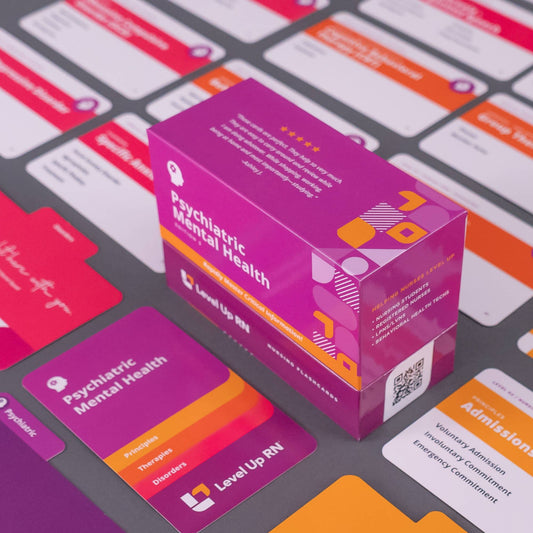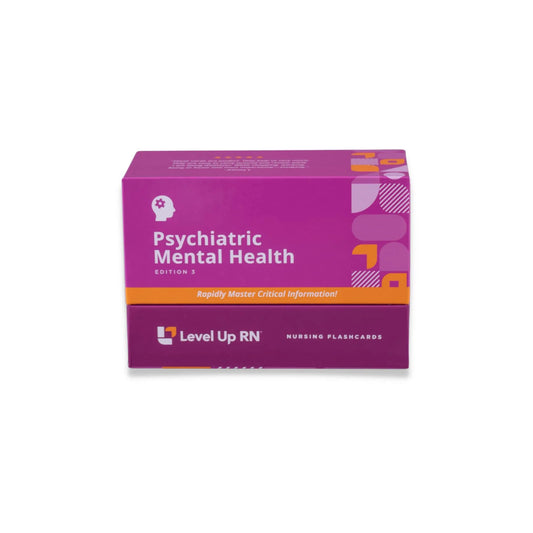In this article, we'll cover the key parts of the mental status examination. What should you be looking for in each step of the exam? Where can you pick up helpful clues? We'll answer these questions and more!
This series follows along with our Psychiatric Mental Health Nursing Flashcards which are intended to help RN and PN nursing students study for nursing school exams, including the ATI, HESI, and NCLEX.
General survey review
A general survey, covered in our Health Assessment Flashcards for Nursing Students, is an assessment performed on entering your patient's room, wherein you make observations about their appearance, their behavior, their speech, their hygiene, etc. You will notice, as we dive into the components of a mental status examination, that some of these are similar to the steps in a general survey.
The mental status examination
A mental status examination is a standardized method of evaluating the mental status of a patient. This examination includes an assessment of a patient's appearance, behavior, motor activity, speech, mood and affect, thought process and content, perception, cognition, insight, and judgment. We'll go into each of these in more depth below.
Appearance
When assessing a patient's appearance as part of a mental status examination, observe what the patient is wearing. Is it appropriate for the weather?
Notice their hygiene and grooming. Does it look like they're taking care of themselves? Those are things to note. As we will learn later in this series, those with poor hygiene may be experiencing depression or another mental health disorder.
As part of evaluating appearance, you can also note scars and tattoos which can sometimes, but of course not always, have relevance in the mental health setting. Scars may indicate self-harm, abuse, or drug use, and tattoos may represent a lost loved one or gang activity.
Behavior
In evaluating a patient's behavior, notice whether the patient is cooperative, or if they are agitated or distressed. In addition to evaluating their behavior, apply critical thinking to whether their behavior fits the circumstances. For example, if a patient was brought in by police for involuntary evaluation, it may make sense that they are less cooperative. However, if that same patient was smiling, laughing and highly agreeable during the exam, this behavior does not fit the circumstances and could be noted as an unexpected finding.
Psychiatric Mental Health - Nursing Flashcards
Motor activity
Motor activity describes how a patient is moving and what kind of movements they have. When assessing a patient's motor activity as part of the mental status exam, check out their posture. Combative posturing can be a predictor of violence or aggression.
Does the patient have involuntary motor movements? For example, if they have a tremor, then that may be indicative of Parkinson's disease, but it also could be a side effect of a bipolar medication, such as lithium.
Speech
As you interview the patient, you will be indirectly observing their speech. This means they are answering other questions verbally, so you are evaluating their speech as part of that. What is the amount of verbalization—how much is the patient talking? What is their rate and tone of speaking? Do they have slurred speech? If they have slurred speech, that could be indicative of substance abuse.
If the patient speaks very quickly, moving from one topic to another without any pauses, then you might suspect mania. These are all important things to note in evaluating speech.
Mood and affect
When you are evaluating a patient in a mental status exam, you will take note of their mood and their affect. Mood and affect are different. The patient's mood is how the patient reports feeling to you, and their affect is their expression, on their face and in their voice. Sometimes the patient's reported mood and their affect will be the same, but sometimes they won't. Make note of the patient's mood and affect and whether or not they differ.
Affect in this usage is pronounced differently than the more-common-used "affect vs. effect." Affect as it pertains to a person's observable emotion has an A sound like the word apple, whereas affect as a verb meaning "to have an effect on" has an A sound that sounds like "uh."
Thought process and content
As part of the mental status exam, notice if your patient's thinking is organized and linear. Are they having delusions? Are they suicidal? Are they homicidal? These things are going to be important to find out. If the patient is suicidal, you're definitely going to want to get one-on-one observation for that patient to keep them safe.
If you are interested in learning more about how to care for suicidal patients, please check out our in-depth article on Sexual Assault and Suicide (content warning).
Perception
Your patient's perception is what they perceive (see, hear, feel, etc) going on around them. A hallucination is an example of a perception—it is a false sensory perception.
Is the patient having hallucinations? Are they hearing voices? What do the voices say? You definitely want to ask these questions directly when you are interviewing the patient as part of the mental status exam.
Cognition
Is the patient alert and oriented? A patient being oriented means they are functioning cognitively, and are alert and aware of what's going on. They know their name, their current location, the date.
How is their short-term and long-term memory? Short-term memory can be assessed with questions pertaining to recent events, like what they had for breakfast. Long term memory can be assessed by asking the patient about when they had a child, or where they went to school.
A patient's attention and concentration can be assessed during the exam by observing how well they stay focused when answering questions.
Insight
Is the patient aware of their own illness? What is their understanding of their illness? A patient may be having auditory hallucinations, but be able to acknowledge they are not real—this would be an example of disordered perception but fair insight.
Judgment
Judgment refers to a patient's ability to make good decisions. Is the patient able to make good decisions? For example, judgment might be impaired due to bipolar disorder, Alzheimers, or alcohol abuse.
Using mental health examinations in non-mental health settings
In this video, Cathy shares that even though she does not work in a psychiatric setting, for every patient she takes care of, she does a "mini" mental health examination as she's caring for them. She wants to make effective plans for them as part of their discharge.
She will assess if the patient is able to go home and take care of themselves, and take care of their new ostomy, or their wound VAC, or if she needs to recommend that they be discharged to a skilled nursing or long-term care facility. She emphasizes the importance of assessing where your patient stands in their cognition, their mood, and ability to take care of themselves, no matter which floor or specialty you are in.


